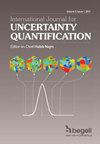A NON-NESTED INFILLING STRATEGY FOR MULTIFIDELITY BASED EFFICIENT GLOBAL OPTIMIZATION
IF 1.8
4区 工程技术
Q2 ENGINEERING, MULTIDISCIPLINARY
International Journal for Uncertainty Quantification
Pub Date : 2021-01-01
DOI:10.1615/int.j.uncertaintyquantification.2020032982
引用次数: 1
Abstract
Efficient Global Optimization (EGO) has become a standard approach for the global optimization of complex systems with high computational costs. EGO uses a training set of objective function values computed at selected input points to construct a statistical surrogate model, with low evaluation cost, on which the optimization procedure is applied. The training set is sequentially enriched, selecting new points, according to a prescribed infilling strategy, in order to converge to the optimum of the original costly model. Multi-fidelity approaches combining evaluations of the quantity of interest at different fidelity levels have been recently introduced to reduce the computational cost of building a global surrogate model. However, the use of multi-fidelity approaches in the context of EGO is still a research topic. In this work, we propose a new effective infilling strategy for multi-fidelity EGO. Our infilling strategy has the particularity of relying on non-nested training sets, a characteristic that comes with several computational benefits. For the enrichment of the multi-fidelity training set, the strategy selects the next input point together with the fidelity level of the objective function evaluation. This characteristic is in contrast with previous nested approaches, which require estimation all lower fidelity levels and are more demanding to update the surrogate. The resulting EGO procedure achieves a significantly reduced computational cost, avoiding computations at useless fidelity levels whenever possible, but it is also more robust to low correlations between levels and noisy estimations. Analytical problems are used to test and illustrate the efficiency of the method. It is finally applied to the optimization of a fully nonlinear fluid-structure interaction system to demonstrate its feasibility on real large-scale problems, with fidelity levels mixing physical approximations in the constitutive models and discretization refinements.基于多保真度的非嵌套填充策略的高效全局优化
高效全局优化(EGO)已成为复杂系统高计算成本全局优化的标准方法。EGO使用在选定的输入点计算的目标函数值的训练集来构建一个评估成本低的统计代理模型,并在此模型上应用优化程序。按照规定的填充策略,对训练集进行逐次充实,选择新的点,以收敛到原代价模型的最优。多保真度方法结合了不同保真度水平的兴趣数量的评估,最近被引入以减少构建全局代理模型的计算成本。然而,多保真度方法在EGO背景下的应用仍然是一个研究课题。本文提出了一种新的多保真度EGO填充策略。我们的填充策略具有依赖于非嵌套训练集的特殊性,这一特性带来了几个计算上的好处。为了丰富多保真度训练集,该策略结合目标函数评价的保真度选择下一个输入点。这个特性与以前的嵌套方法形成对比,后者需要估计所有较低的保真度级别,并且更新代理的要求更高。由此产生的EGO过程大大降低了计算成本,尽可能避免了在无用的保真度水平上的计算,但它对水平和噪声估计之间的低相关性也更加稳健。用分析问题来验证和说明该方法的有效性。最后将该方法应用于一个完全非线性流固相互作用系统的优化,通过本构模型的物理近似和离散化改进的保真度,验证了该方法在实际大规模问题上的可行性。
本文章由计算机程序翻译,如有差异,请以英文原文为准。
求助全文
约1分钟内获得全文
求助全文
来源期刊

International Journal for Uncertainty Quantification
ENGINEERING, MULTIDISCIPLINARY-MATHEMATICS, INTERDISCIPLINARY APPLICATIONS
CiteScore
3.60
自引率
5.90%
发文量
28
期刊介绍:
The International Journal for Uncertainty Quantification disseminates information of permanent interest in the areas of analysis, modeling, design and control of complex systems in the presence of uncertainty. The journal seeks to emphasize methods that cross stochastic analysis, statistical modeling and scientific computing. Systems of interest are governed by differential equations possibly with multiscale features. Topics of particular interest include representation of uncertainty, propagation of uncertainty across scales, resolving the curse of dimensionality, long-time integration for stochastic PDEs, data-driven approaches for constructing stochastic models, validation, verification and uncertainty quantification for predictive computational science, and visualization of uncertainty in high-dimensional spaces. Bayesian computation and machine learning techniques are also of interest for example in the context of stochastic multiscale systems, for model selection/classification, and decision making. Reports addressing the dynamic coupling of modern experiments and modeling approaches towards predictive science are particularly encouraged. Applications of uncertainty quantification in all areas of physical and biological sciences are appropriate.
 求助内容:
求助内容: 应助结果提醒方式:
应助结果提醒方式:


